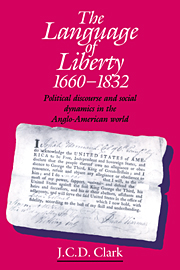 The Language of Liberty 1660–1832
The Language of Liberty 1660–1832 Book contents
- Frontmatter
- Contents
- Preface
- Acknowledgements
- List of abbreviations
- INTRODUCTION: THE STRUCTURE OF ANGLO-AMERICAN POLITICAL DISCOURSE
- 1 THE CONFLICT BETWEEN LAWS: SOVEREIGNTY AND STATE FORMATION IN THE UNITED KINGDOM AND THE UNITED STATES
- 2 THE CONFLICT BETWEEN DENOMINATIONS: THE RELIGIOUS IDENTITY OF EARLY-MODERN SOCIETIES
- 3 PREDISPOSITIONS: REBELLION AND ITS SOCIAL CONSTITUENCIES IN THE ENGLISH ATLANTIC EMPIRE, 1660–1832
- 4 POLITICAL MOBILISATION: THE AMERICAN REVOLUTION AS A WAR OF RELIGION
- CONCLUSION: ‘DESOLATING DEVASTATION’: THE ORIGINS OF ANGLO-AMERICAN DIVERGENCE
- Index
3 - PREDISPOSITIONS: REBELLION AND ITS SOCIAL CONSTITUENCIES IN THE ENGLISH ATLANTIC EMPIRE, 1660–1832
Published online by Cambridge University Press: 29 December 2009
- Frontmatter
- Contents
- Preface
- Acknowledgements
- List of abbreviations
- INTRODUCTION: THE STRUCTURE OF ANGLO-AMERICAN POLITICAL DISCOURSE
- 1 THE CONFLICT BETWEEN LAWS: SOVEREIGNTY AND STATE FORMATION IN THE UNITED KINGDOM AND THE UNITED STATES
- 2 THE CONFLICT BETWEEN DENOMINATIONS: THE RELIGIOUS IDENTITY OF EARLY-MODERN SOCIETIES
- 3 PREDISPOSITIONS: REBELLION AND ITS SOCIAL CONSTITUENCIES IN THE ENGLISH ATLANTIC EMPIRE, 1660–1832
- 4 POLITICAL MOBILISATION: THE AMERICAN REVOLUTION AS A WAR OF RELIGION
- CONCLUSION: ‘DESOLATING DEVASTATION’: THE ORIGINS OF ANGLO-AMERICAN DIVERGENCE
- Index
Summary
REBELLIONS AND THEIR ANALYSIS IN THE ANGLO-AMERICAN TRADITION
If law and religion followed the patterns already outlined, it remains to trace their impact in the daily political events of the English-speaking world and, especially, in those crises on both sides of the Atlantic which saw the established order repeatedly, and sometimes successfully, challenged. Yet acts of resistance to constituted authority within the hegemonic political and ecclesiastical order described in this book pose a special problem for historical analysis, since modern historiography has until recently marginalised those very features of the social order which were the targets of resistance and defined its nature. Moreover, the main category of explanation has itself been reified: ‘revolution’ has been turned from an explanation into a thing to be explained, and ‘rebellion’ reduced to a pejorative and diminutive term. Consequently, revolutions are conventionally explained by reference to a timeless model of what revolutions are or should be; rebellions are dismissed as minor challenges to governments, unsuccessful because not equipped with the appropriate ideological charge. It is assumed here, by contrast, that a series of contingent features, especially political and military contingencies, ensured that episodes like 1660, 1688 and 1776 should succeed while those of 1685, 1715, 1744 and 1798 did not: a revolution is not essentially different from a successful rebellion, and no explanation is or can be offered of the nature of revolutions ‘as such’.
The nature of those contingencies is at the centre of this study; yet the histories of western societies after the French Revolution have masked some of the early-modern characteristics of political mobilisation.
- Type
- Chapter
- Information
- The Language of Liberty 1660–1832Political Discourse and Social Dynamics in the Anglo-American World, 1660–1832, pp. 218 - 295Publisher: Cambridge University PressPrint publication year: 1993


